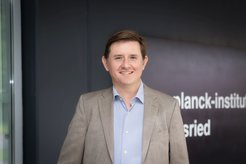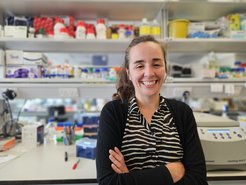
Keynote Speakers
Machine Learning meets Molecular Genetics!
Karsten Borgward

Max Planck Institute of Biochemistry, Martinsried
Karsten Borgwardt is Director of the Department of Machine Learning and Systems Biology at the Max Planck Institute of Biochemistry in Martinsried, Germany since February 2023. His work won several awards, including the 1 million Euro Krupp Award for Young Professors in 2013 and a Starting Grant 2014 from the ERC-backup scheme of the Swiss National Science Foundation. Prof. Borgwardt has been leading large national and international research consortia, including the “Personalized Swiss Sepsis Study” (2018-2023) and the subsequent National Data Stream on infection-related outcomes in Swiss ICUs (2022-2023), and two Marie Curie Innovative Training Networks on Machine Learning in Medicine (2013-2016 and 2019-2022).
Website: www.biochem.mpg.de/borgwardt
Machine Learning in Systems Biology: Now and Next
Teresa Rayon
Babraham Institute, Cambridge

Teresa Rayon is a Tenure-Track Group Leader at the Babraham Institute in the Epigenetics and Signaling Programmes since February 2022. She obtained her MSc in Biology from the Autónoma University of Madrid in 2007. For her PhD at Miguel Manzanares’ group at CNIC in Madrid, Teresa studied the regulation of CDX2 during mammalian pre-implantation development. In 2016, she joined the Briscoe lab supported by an EMBO postdoctoral fellowship. For her postdoc, she compared human and mouse neural tube development and established in vitro motor neuron differentiation models from mouse and human embryonic stem cells to investigate developmental tempo. In 2022 she was awarded an ERC Starting Grant to start her Comparative Stem Cell Dynamics Lab in Cambridge. At the Babraham, her research is focused in understanding how changes in the proteostasis networks affect the speed or function of developmental programmes.
Website: rayonlab.org
The search for cell-intrinsic mechanisms of developmental tempo
Understanding the rules that determine how cells and organisms can precisely initiate and terminate processes at specified times and how do they modulate the rate at which they tick will help us explain when processes go awry, for example in tissue overgrowth or deficits. Moreover, differences in timing (heterochronies) are a major driver for evolutionary change. Although cellular and molecular mechanisms controlling developmental processes are often evolutionarily conserved, the speed at which these operate can vary substantially between species.
Work in the lab aims to identify the molecular mechanisms that determine the pace of biological processes. Previously, we developed equivalent stem cell differentiation models to spinal cord motor neurons and showed that differences in tempo between species can be recapitulated in vitro. We provided evidence that this is not due to differences in signalling, nor the sequence of genes or their regulatory elements. Instead, we find an approximately two-fold increase in protein stability in human cells compared to mouse and this can account for the slower pace of human development (Rayon et al., Science 2020). We are now taking these findings forward to establish a causal link between protein stability and developmental timing. In addition, we are using mouse diapause as a physiological system to investigate modulation of developmental rate.

